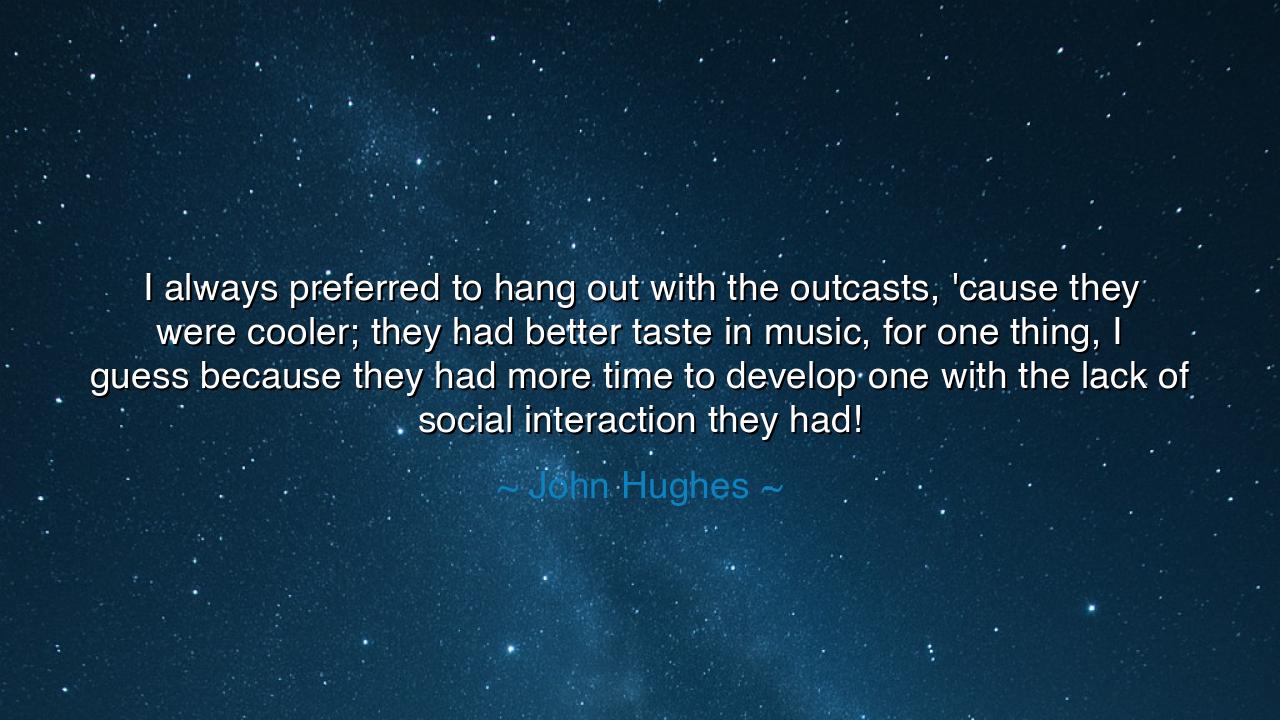
I always preferred to hang out with the outcasts, 'cause they
I always preferred to hang out with the outcasts, 'cause they were cooler; they had better taste in music, for one thing, I guess because they had more time to develop one with the lack of social interaction they had!






"I always preferred to hang out with the outcasts, 'cause they were cooler; they had better taste in music, for one thing, I guess because they had more time to develop one with the lack of social interaction they had!" These words, spoken by the legendary filmmaker John Hughes, reveal a profound truth about the nature of individuality and creativity. Hughes, a master of capturing the essence of youth and rebellion, speaks of the outcasts—the ones who sit on the fringes of society, overlooked and often rejected by the mainstream. Yet it is precisely this rejection that forges their character, their taste, and their ability to see the world from a fresh perspective. In the absence of societal pressures and norms, these individuals find the space to develop their own identity, free from the chains of conformity.
At the heart of this reflection lies an ancient truth: those who walk alone are often the ones who blaze new trails. The great thinkers, artists, and innovators throughout history have often been those who were considered odd, strange, or out of place in their time. Leonardo da Vinci, the master of art and invention, was often seen as an outsider, not easily fitting into the conventional circles of his day. He spent long hours alone, not surrounded by the chatter and demands of society, but in quiet reflection and solitary exploration. It was in this solitude that he gave birth to some of the greatest works the world has ever known. His vision was not shaped by the opinions of others, but by his own inner calling, and this is what set him apart as a true genius.
Similarly, Vincent van Gogh, another iconoclast, spent much of his life on the fringes of society, misunderstood by his peers and isolated by his mental struggles. But it was through this very isolation that he developed a style of painting that would revolutionize the world of art. The outcasts, in their solitude, are given the freedom to nurture their own passions, to cultivate their own tastes, and to pursue their own truths. It is often in their silence, away from the noise of societal expectations, that their creativity flourishes.
Let us consider the wisdom of the ancients. The great philosophers often taught that true wisdom comes not from fitting in, but from the courage to be your true self, regardless of whether others accept you. Socrates, the ancient philosopher, was known for his willingness to stand apart from the masses and question everything. His courage to challenge convention and his commitment to seeking truth above all else led to his ultimate martyrdom. Yet it was this very isolation—this willingness to be different—that cemented his place as one of the most revered thinkers in history. Socrates knew that to seek truth and greatness, one must sometimes walk alone, unafraid of being labeled an outcast.
The outcasts are those who refuse to conform to the pressures of society. They are the dreamers, the misfits, the rebels who refuse to be confined by the ordinary. They have the courage to question, to explore, and to create without the need for approval or acceptance. In their isolation, they develop a deep connection to their own inner world, which often leads to profound discoveries and the creation of art, music, and ideas that transform the world. They reject the trivial in favor of something more authentic and meaningful. It is through their freedom from the tyranny of societal expectations that they are able to discover who they truly are.
In every age, those who have been labeled as outsiders have often been the ones to pioneer new movements and to create legacies that endure for generations. John Hughes, through his films, captured the spirit of the outsider. His characters—the rebellious teens, the misunderstood geniuses, the nonconformists—became the voices of an entire generation, reminding us that it is not the popular or the conforming who shape the future, but those who dare to be different. The coolness that Hughes speaks of is not the superficial cool of the popular crowd, but the deeper, more lasting coolness of those who are unafraid to stand apart, to embrace their uniqueness, and to follow their own path.
Now, let us take this wisdom into our own lives. Do not fear being an outcast. Do not fear standing alone, for it is often in the solitude of isolation that you will find your true voice. Embrace your individuality, and let it guide you toward a path of self-discovery and creative expression. Your uniqueness is your greatest strength, and in that strength, you will find the power to shape the future. Remember, it is often the misfits, the rebels, and the outsiders who change the world. Give yourself the space to be different, and trust that it is in this difference that your true greatness lies.






AAdministratorAdministrator
Welcome, honored guests. Please leave a comment, we will respond soon